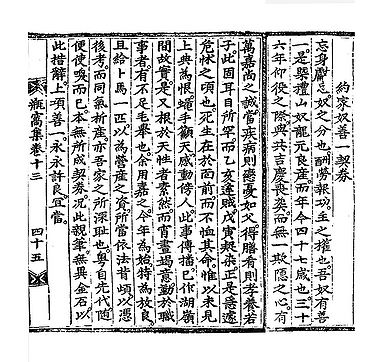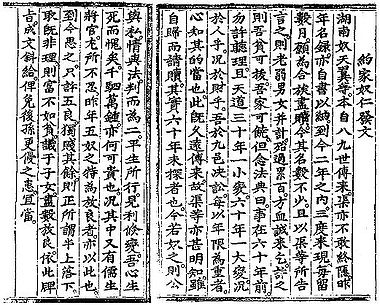"Certificate of Manumission for the House Slave"의 두 판 사이의 차이
Jaeyoon.song (토론 | 기여) |
|||
| (사용자 2명의 중간 판 13개는 보이지 않습니다) | |||
| 1번째 줄: | 1번째 줄: | ||
| − | {{Primary Source | + | {{Primary Source Document2 |
|Image = 약가노선일계권.JPG | |Image = 약가노선일계권.JPG | ||
| − | | | + | |Image2 = 약가노인발문.JPG |
|English = Certificate of Manumission for the House Slave | |English = Certificate of Manumission for the House Slave | ||
|Chinese = 約家奴善一契券, 約家奴仁發文 | |Chinese = 約家奴善一契券, 約家奴仁發文 | ||
| − | |Korean = 약가노선일계권, 약가노인발문 | + | |Korean = [http://db.itkc.or.kr/itkcdb/text/mvMainListPopup.jsp?bizName=MV&mc=yes&signguboon=mv_s_all&seojititle=&seojiid=kc_mm_a438&gunchaid=av013&muntitleid=04&finid=026 약가노선일계권], |
| + | [http://db.itkc.or.kr/itkcdb/text/mvMainListPopup.jsp?bizName=MV&mc=yes&signguboon=mv_s_all&seojititle=&seojiid=kc_mm_a438&gunchaid=av013&muntitleid=04&finid=027 약가노인발문] | ||
|Genre = [[Social Life and Economic Strategies]] | |Genre = [[Social Life and Economic Strategies]] | ||
|Type = [[Record]] | |Type = [[Record]] | ||
| 10번째 줄: | 11번째 줄: | ||
|Year = | |Year = | ||
|Key Concepts= | |Key Concepts= | ||
| − | |Translator = [[2016 Hanmun Workshop | | + | |Translator = [[2016 Summer Hanmun Workshop (Advanced)#수강생 | Participants of 2016 Summer Hanmun Workshop (Advanced Translation Group)]] |
|Editor = [[송재윤|Song Jaeyoon]], [http://scholar.harvard.edu/kang Hyeok Hweon Kang] | |Editor = [[송재윤|Song Jaeyoon]], [http://scholar.harvard.edu/kang Hyeok Hweon Kang] | ||
|Translation Year = 2016 | |Translation Year = 2016 | ||
| 31번째 줄: | 32번째 줄: | ||
Starting from this year, I shall specially manumit him to be a commoner. I shall also give him a stallion as the seed for his prosperity, for which I am now writing on the flipside to substantiate later considerations in accordance with law. If, at some point, my family members try to divide [and take] his property, this would be a deep shame for my household. | Starting from this year, I shall specially manumit him to be a commoner. I shall also give him a stallion as the seed for his prosperity, for which I am now writing on the flipside to substantiate later considerations in accordance with law. If, at some point, my family members try to divide [and take] his property, this would be a deep shame for my household. | ||
<br/> | <br/> | ||
| − | From previous generations, [my ancestors] have used slaves at their convenience, [but] originally there were no contractual documents. I hereby use my own handwriting, which is no different from inscriptions on bronze and stone, to put my thoughts into words. Sŏnil above is to be given commoner status forever, and this | + | From previous generations, [my ancestors] have used slaves at their convenience, [but] originally there were no contractual documents. I hereby use my own handwriting, which is no different from inscriptions on bronze and stone, to put my thoughts into words. Sŏnil above is to be given commoner status forever, and it should be done this way. |
<br/> | <br/> | ||
<br/> | <br/> | ||
| − | Cho Songnyŏn, [my] | + | Cho Songnyŏn, [my] non-agnatic grandson and the Jr 5-rank (朝散大夫) former pyŏlchwa (別坐), is the scrivener. [Signature] |
|| | || | ||
'''約家奴善一契券''' | '''約家奴善一契券''' | ||
| 62번째 줄: | 63번째 줄: | ||
Now, if I were to [take them back as] slaves, then the public and the private, my sentiment and the law, would be separated into two. If my lifelong conduct were to change suddenly for the sake of profit, I would be forever ashamed. Even if I had great wealth (“thousand quadrigas and ten-thousand ''sŏm'' of rice”), how could I treasure them? Needless to say, it is all the more unbearable knowing that in their midst are also scholars and military officials. | Now, if I were to [take them back as] slaves, then the public and the private, my sentiment and the law, would be separated into two. If my lifelong conduct were to change suddenly for the sake of profit, I would be forever ashamed. Even if I had great wealth (“thousand quadrigas and ten-thousand ''sŏm'' of rice”), how could I treasure them? Needless to say, it is all the more unbearable knowing that in their midst are also scholars and military officials. | ||
<br/> | <br/> | ||
| − | Last year, I specially manumitted five slaves to commoner status also for this reason. Thinking of that now, only manumitting five implies I am mistreating the rest. This is stopping when the job is only half done. If I do something unprincipled, then wealth is not as good as poverty. I have thus discussed this with my children and [we agreed] to the manumission of all slaves. Based on this certificate (牌旨), a document will be composed and issued, so as to protect this family from the encroachment of my descendants. | + | Last year, I specially manumitted five slaves to commoner status also for this reason. Thinking of that now, only manumitting five implies I am mistreating the rest. This is stopping when the job is only half done. If I do something unprincipled, then wealth is not as good as poverty. I have thus discussed this with my children and [we agreed] to the manumission of all slaves. Based on this certificate (牌旨), a document will be composed and issued, so as to protect this family from the encroachment of my descendants. It should be done this way. |
|| | || | ||
'''約家奴仁發文''' | '''約家奴仁發文''' | ||
| 101번째 줄: | 102번째 줄: | ||
| + | [[Category:Summer Hanmun Workshop]] | ||
[[Category:2016 Advanced Translation Group]] | [[Category:2016 Advanced Translation Group]] | ||
| + | [[Category:Translation]] | ||
[[Category:Social Life and Economic Strategies]] | [[Category:Social Life and Economic Strategies]] | ||
2017년 7월 16일 (일) 14:43 기준 최신판
| Primary Document | |
|---|---|

| |

| |
| Title | |
| English | Certificate of Manumission for the House Slave |
| Chinese | 約家奴善一契券, 約家奴仁發文 |
| Korean | 약가노선일계권, |
| Document Details | |
| Genre | Social Life and Economic Strategies |
| Type | Record |
| Author(s) | Yi Hyeongsang (李衡祥, 1653-1733) |
| Year | |
| Key Concepts | |
| Translation Info | |
| Translator(s) | Participants of 2016 Summer Hanmun Workshop (Advanced Translation Group) |
| Editor(s) | Song Jaeyoon, Hyeok Hweon Kang |
| Year | 2016 |
Primary Source Text
| English | Classical Chinese |
|---|---|
|
Certificate of Manumission for the House Slave Sŏnil
|
約家奴善一契券
|
|
Certificate of Manumission for the House Slaves Inbal et al.
|
約家奴仁發文
|
Discussion Questions
- Was Korea a slave society? What constitutes a slave or a slave society? Is nobi a slave?
- Why is slavery not discussed in Korean historiography as much?
- How does the idea of a land-owning slave or an outside-resident slave different from the slaves we are familiar with?
- How might you compare the nobi system with slavery institutions from elsewhere in the world? Is the nobi system qualitatively different from, for example, American slavery? Is it appropriate or useful to compare the two? Is it problematic to use universalizing analytic categories such as slavery to frame research?
- What does this document tell us about the position and mobility of slaves in Choson society? Who is determining for us how to understand this case? To what extent does this document appear as formulaic rhetoric? Can we ever know a slave’s opinion?
- Why would a male slave want his family to be reincorporated into his master’s family after 60 years of “freedom” (fending for themselves without paying tribute to the master)? What is the main driving force behind Yi Hyŏngsang’s manumission of slaves? How do the two cases differ in this regard? What is his attitude towards wealth, as suggested in the second document?
Further Readings
- Ellen Salem. “The Landowning Slave.” Korea Journal 16:4 (April 1976): 27-34.
- Ellen Salem. “Slavery in Medieval Korea.” Unpubl. Ph.D. diss., Columbia University, (1978).
- Ellen Salem. “The Utilization of Slave Labor in the Koryŏ Period; 918-1392.” Papers of the 1st International Conference on Korean Studies, 1980: 630-642.
- Kim Hyong-in, “Rural Slavery in Antebellum South Carolina and Early Chosŏn Korea,” Ph.D dissertation, University of New Mexico, 1990.
- Palais, James B. “Slavery and Slave Society in the Koryŏ Period,” Journal of Korean Studies 5 (1984): 173-90.
- Rhee Young-hoon and Yang Donghyu. “Korean Nobi in American Mirror: Yi Dynasty Coerced Labor in Comparison to the Slavery in the Antebellum Southern United States.”
- Kim, Chong Sun. “Slavery in Silla and its Sociological and Economic Implications.” in Andrew G. Nahm, ed., Traditional Korea: Theory and Practice (1974): 29–43.
- Kim Kichung. “Unheard Voices: The Life of the Nobi in O Hwi-mun’s Swaemirok.” Korean Studies 27 (2003): 10–37.
- “Case 3. Yi Pong-dol: A Defiant Slave Challenges His Overlord with Death (Anŭi, Kyŏngsang Province, 1842).” In Sun Joo Kim and Jungwon Kim, Wrongful Deaths: Selected Inquest Records from Nineteenth-Century Korea. Seattle: University of Washington Press, 2014), 55–61.
- Kim, Joy Sung-hee, “Representing Slavery. Class and Status in Late Chosŏn-Korea,” Ph.D dissertation, Columbia University, 2004.